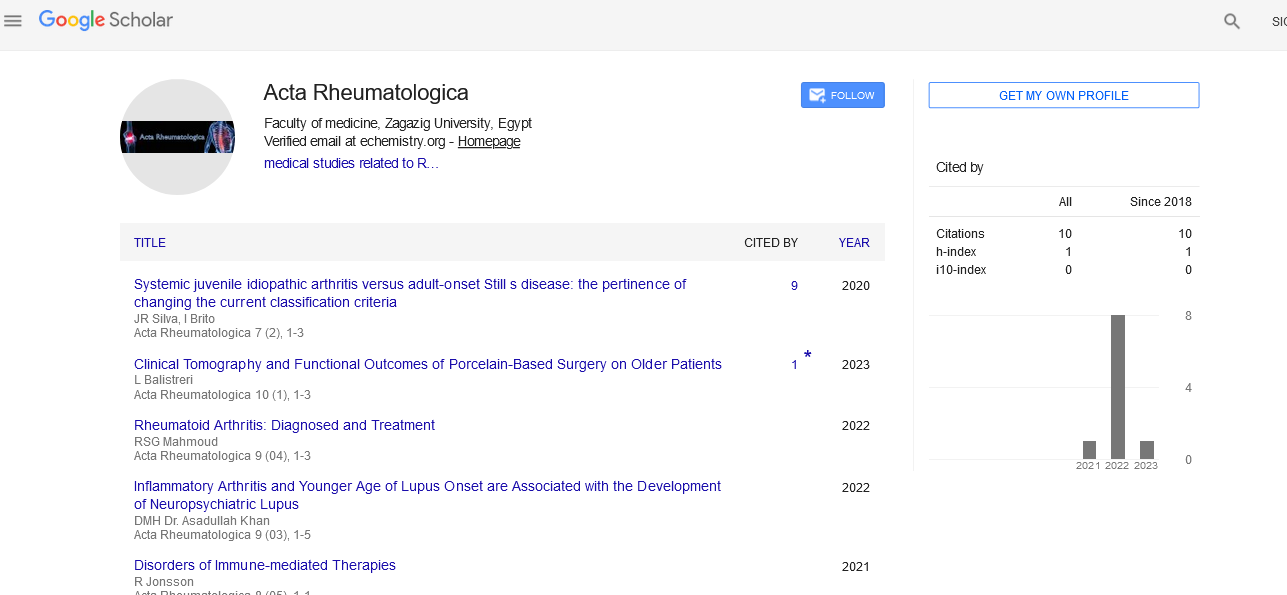Perspective - (2024) Volume 11, Issue 2
Delving into the World of Rheumatology: Understanding the Expertise and Impact of Rheumatologists
Flavia Fedeles*
Department of Medicine, New York Medical College, New York, USA
*Correspondence:
Flavia Fedeles, Department of Medicine, New York Medical College, New York,
USA,
Email:
Received: 10-Mar-2024, Manuscript No. IPAR-24-14675;
Editor assigned: 13-Mar-2024, Pre QC No. IPAR-24-14675 (PQ);
Reviewed: 28-Mar-2024, QC No. IPAR-24-14675;
Revised: 05-Apr-2024, Manuscript No. IPAR-24-14675 (R);
Published:
15-Apr-2024
Introduction
Rheumatology stands as a multifaceted medical specialty that
encompasses the diagnosis, management, and treatment of a
diverse range of musculoskeletal and autoimmune disorders.
Rheumatologists, the specialized physicians at the forefront of
this field, possess a unique skill set and expertise in addressing
the complex needs of patients with conditions such as
rheumatoid arthritis, lupus, and osteoarthritis. In this
comprehensive article, we embark on a journey through the
fascinating realm of rheumatology, exploring the pivotal role of
rheumatologists, the conditions they treat, and the innovative
approaches they employ to improve the lives of their patients.
Description
The role of the rheumatologist: Experts in
musculoskeletal and autoimmune disorders
Rheumatologists are highly trained physicians who specialize
in the diagnosis, management, and treatment of diseases that
affect the joints, muscles, bones, and immune system. Their
expertise extends beyond the musculoskeletal system to
encompass a wide range of autoimmune conditions, including
rheumatoid arthritis, systemic lupus erythematosus, psoriatic
arthritis, and gout, among others. Rheumatologists undergo
extensive training in internal medicine followed by fellowship
training in rheumatology, equipping them with the knowledge
and skills needed to provide comprehensive care for patients
with complex and often chronic conditions.
Conditions treated by rheumatologists: A spectrum
of musculoskeletal and autoimmune disorders
Rheumatologists diagnose and treat a broad spectrum of
conditions that affect the musculoskeletal system and immune
system, each with its own unique presentation, pathophysiology,
and treatment approach. Rheumatoid arthritis, an autoimmune
disorder characterized by joint inflammation and damage, is
among the most common conditions managed by
rheumatologists. Other conditions treated by rheumatologists
include osteoarthritis, systemic lupus erythematosus,
spondyloarthritis, vasculitis, and fibromyalgia, to name a few.
Rheumatologists also play a crucial role in the management of
inflammatory and autoimmune diseases that affect internal
organs, such as systemic sclerosis and inflammatory myopathies.
Diagnostic expertise: Unraveling the complexity of
rheumatic conditions
Diagnosing rheumatic conditions requires a thorough
understanding of the clinical presentation, laboratory findings,
imaging studies, and, in some cases, invasive procedures such as
joint aspiration or biopsy. Rheumatologists are skilled in
conducting comprehensive evaluations to accurately diagnose
and differentiate between various rheumatic conditions. They
interpret laboratory tests, including inflammatory markers,
autoantibodies, and imaging studies such as X-rays, ultrasound,
and Magnetic Resonance Imaging (MRI), to assess disease
activity, monitor progression, and guide treatment decisions.
Treatment modalities: A multifaceted approach to
managing rheumatic diseases
The treatment of rheumatic diseases is tailored to the
individual patient's needs, taking into account the specific
condition, disease severity, comorbidities, and treatment goals.
Rheumatologists employ a variety of treatment modalities,
including medications, physical therapy, lifestyle modifications,
and patient education, to manage symptoms, prevent disease
progression, and improve quality of life. Nonsteroidal Anti-
Inflammatory Drugs (NSAIDs), Disease-Modifying Antirheumatic
Drugs (DMARDs), biologic agents, and corticosteroids are among
the pharmacological therapies commonly used by
rheumatologists to control inflammation, reduce pain, and
preserve joint function.
Innovative approaches: Harnessing the power of
research and technology
Advances in research and technology continue to drive
innovation in the field of rheumatology, offering new insights
into the pathogenesis of rheumatic diseases and novel
treatment approaches. Biologic therapies targeting specific
cytokines or immune pathways have revolutionized the
management of conditions such as rheumatoid arthritis,
psoriatic arthritis, and ankylosing spondylitis, providing targeted relief for patients with refractory disease. Emerging
technologies, such as telemedicine, remote monitoring devices,
and wearable sensors, are also transforming the delivery of
rheumatologic care, allowing for more personalized, accessible,
and patient-centered approaches to treatment.
Collaborative care: A team-based approach to
rheumatologic management
Rheumatologists work closely with a multidisciplinary team of
healthcare professionals, including primary care physicians,
nurse practitioners, physician assistants, physical therapists,
occupational therapists, and social workers, to provide
comprehensive care for patients with rheumatic conditions. This
team-based approach ensures that patients receive coordinated,
holistic care that addresses their medical, psychological, and
social needs. Rheumatologists also collaborate with researchers,
educators, and advocacy organizations to advance the field of
rheumatology through research, education, and public
awareness initiatives.
Conclusion
Rheumatologists play a vital role in the diagnosis,
management, and treatment of rheumatic diseases, helping
patients navigate the complexities of their condition and achieve
optimal health and well-being. Through their expertise,
compassion, and dedication, rheumatologists empower patients
to take control of their health, manage their symptoms, and live
fulfilling lives despite the challenges posed by rheumatic
diseases. As the field of rheumatology continues to evolve,
rheumatologists remain at the forefront of innovation, research,
and advocacy, working tirelessly to improve outcomes for
patients and advance the science of rheumatic diseases.
Citation: Fedeles F (2024) Delving into the World of Rheumatology: Understanding the Expertise and Impact of Rheumatologists. Acta Rheuma Vol: 11 No:2





